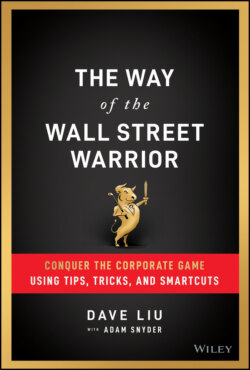Читать книгу The Way of the Wall Street Warrior - Dave Liu - Страница 16
Beat C-3PO
ОглавлениеThere are many books on how to build a great career. This one is for the awoken among you who accept that working hard in the corporate world with all its warts is rarely enough. It's for those of you who practiced sleight-of-hand tricks as kids, delegated chores to younger siblings, and checked vending machines for loose change. It's for you who have realized that the most successful people see opportunity where others see obstacles. It's for those of you who want to learn skills that will prevent you from becoming obsolete—particularly in the not-so-distant future when you'll be competing for work against robots like C-3PO.
You won't learn what I am offering in any school. (I spent over a quarter million bucks at Harvard and Wharton, so I know what I'm talking about.) Our education system doesn't teach the softer elements needed to succeed in the world of high-pressured corporate finance. There are no tactical courses at Wharton or Harvard Business School on salesmanship, emotional intelligence (EQ), or the human psyche, much less cognitive dissonance or biases. (You'll need to slum it at a liberal arts school to find them.) This book assumes you already have an out-of-the-park intelligence, so its primary aim is to help you take the next step and increase your emotional savvy. If you've never heard of EQ, that's a problem, because EQ allows you to identify and manage your emotions, as well as those of others. This book will teach you about EQ. If you have both IQ and EQ, in the business world you will be an awesome, unstoppable combination of Lex Luthor and Superman.
Succeeding on Wall Street or Whatever Street is all about doing the least amount of work for the most pay. Don't get me wrong. You still need to deliver and create great work or your career will be shorter than a reefer at Burning Man,2 but pace yourself. Be the tortoise, not the hare. Be the smartest person in the room by lying in wait and making others think you aren't.
The secret sauce expressed in these pages includes interview tips (exaggerate), maneuvers for getting promoted (you don't need to outrun the bear, just the colleague next to you), ways to fit in (memorizing the top business movies so you can wax poetic about how little Hollywood actually knows about your industry), and ways to cover your ass (document everything—memories are short; emails are forever). I've also done a lot of work for you by summarizing key takeaways at the end of each chapter. Sometimes I'll read an entire book and want to scream, “Just tell me the elevator pitch! What's your point?!” My summaries are like CliffsNotes for grownups or those cheat sheets you bought off that brainiac in high school.
You can thank me now.
